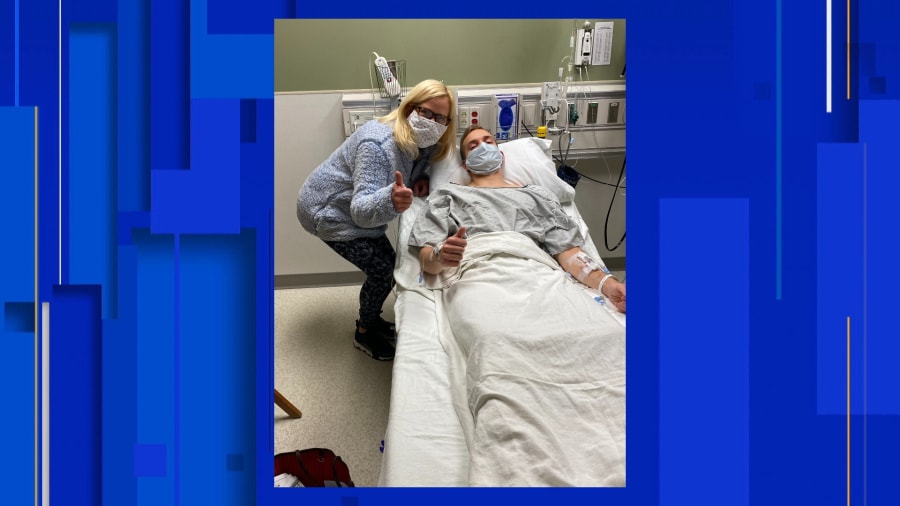EAST LANSING, Mich. – A Michigan State tennis player who lost 60 pounds and had to re-learn how to sit up and walk due to a near-death bout with ulcerative colitis has returned to the court and seized the No. 1 position on his team.
Health battle early in MSU career
Recommended Videos
Jack Winkler was recruited to play tennis for Michigan State during his senior year at Brother Rice High School in Birmingham.
Michigan State’s head tennis coach, Gene Orlando, said Winkler had an “unbelievably successful” summer before the beginning of his college career. But his game lulled throughout his freshman campaign, and that’s when the health problems began.
Winkler experienced severe pain and rectal bleeding, and doctors diagnosed him with ulcerative colitis. Medical officials said that essentially means “inflamed colon.”
His energy, weight and appetite fluctuated throughout that year, but he got back into the swing of tennis with treatment, medication and dietary practices, officials said.
As a sophomore, Winkler earned the No. 1 position on his team and a national ranking, his coach said. But his health wasn’t progressing as well as his performance on the court.
Return to hospital
By Oct. 5, 2019, Winkler was only a few weeks into his junior season. He was “severely anemic and 60 pounds underweight,” doctors said.
He was taken to Royal Oak Beaumont Hospital with compound complications from UC and spent 47 days there battling infections, dehydration, pneumonia, high blood pressure and severe pain, according to the hospital.
“He was so weak and the pain was excruciating,” his mother, Kelly Winkler, said. “The bells and alarms were going off constantly.”
His mother rubbed his feet for hours and dashed home occasionally to make his favorite meal, chicken pasta, in hopes of sparking his appetite.
“I was so scared,” she said. “He had a fever and pneumonia and everything started to fail. I asked our pastor to come and anoint him. We realized we could lose him.”

At night, the medical team determined that Jack Winkler’s colon was perforating.
“If we didn’t operate immediately, the contents of his colon would spill into his body and he would die,” said Dr. Claire Peeples, Winkler’s physician and a colon and rectal surgeon at Beaumont.
Surgery was scheduled for first thing in the morning.
Jack and Kelly Winkler opted to take the first step toward creating a J-pouch for him. The procedure involves a series of surgeries to temporarily reroute the colon and create an abdominal opening, which the patient uses to eliminate waste, giving the colon 3-6 months to heal and rest, according to experts.
“There’s a lot to get used to with having a J-pouch,” Peeples said. “You have to hold liquid stool and there’s a constant sense of urgency. Activity increases the sensation. You have to learn when to go to the bathroom and when not to. It wakes you up in the middle of the night, which makes it hard to ever get good sleep.”
Patients are required to follow strict bathroom routines before bed and before exercising. Winkler had to do so before every practice and match, officials said.
Recovery, return to court
Winkler’s surgery and J-pouch construction were successful, the pain receded and his appetite, weight and muscle started to return, his family said.
He still had to re-learn how to sit up and walk, they said. But he never stopped asking, “When can I get back to tennis?”
Winkler started getting back into tennis shape by hitting the ball around his living room and backyard. Eventually, he began lifting weights.
“I remember he started coming back to practice around January, and even December,” Orlando said. “He could barely walk. He shuffled.”
Winkler’s mother said he developed a pre-practice bathroom routine that included using Imodium to slow down his digestion and intermittent fasting, particularly on match days.
“When he did practice, he was totally depleted,” Kelly Winkler said. “I thought, ‘Well, maybe he could play doubles -- less time on the court.’ I never thought he would come back to play at this level.”
Return to tennis court
After all the surgeries, medications and a new diagnosis of Crohn’s Disease, Winkler returned to the court in September 2021, the fall of his senior year. He made the decision that the 2021-22 season would be his last.
“It had become too hard on his body,” Kelly Winkler said.
Doctors said he adopted a plant-focused diet similar to Tom Brady’s: lean protein, rice, potatoes and vegetables. The diet included limited dairy and no spicy foods, fried foods or marinara sauce. He had lots of homemade stir fries, his family said.

Winkler said he spent hours running “to get my lungs back under me.”
He won his first individual match in September. Before his return, Orlando said Winkler had attended practices, supported teammates and worked as a volunteer during matches.
“Throughout those 2.5 years, in his deepest, darkest moments, Jack kept his mind in the game,” Orlando said. “We also tried to give him something to hope for. Although, at times, it didn’t seem like there was very much to hope for.
“Honestly, my biggest hope for him was that he would be a strong lineup player.”
But Winkler’s strength and momentum escalated steadily, and he has since recaptured the No. 1 position on his team, according to his coach.
“It wasn’t handed to him,” Orlando said. “It was one surgery and complication after another, and here he is, beating two nationally ranked players this season. He earned it.
“After all the setbacks and what this disease did to his body, it really is shocking to see how far he’s come. I don’t think he’d be here without having faith in his teammates and their faith in him.”
“I’m much more grateful now for things I might have taken for granted,” Winkler said. “I’m playing better than I ever thought I could play.”
Heading into the Big Ten season this weekend, he still has plenty of tennis to play.
“He looks like a Big Ten, All-American athlete,” Orlando said. “He is well positioned to be a Big Ten, All-American athlete.”


